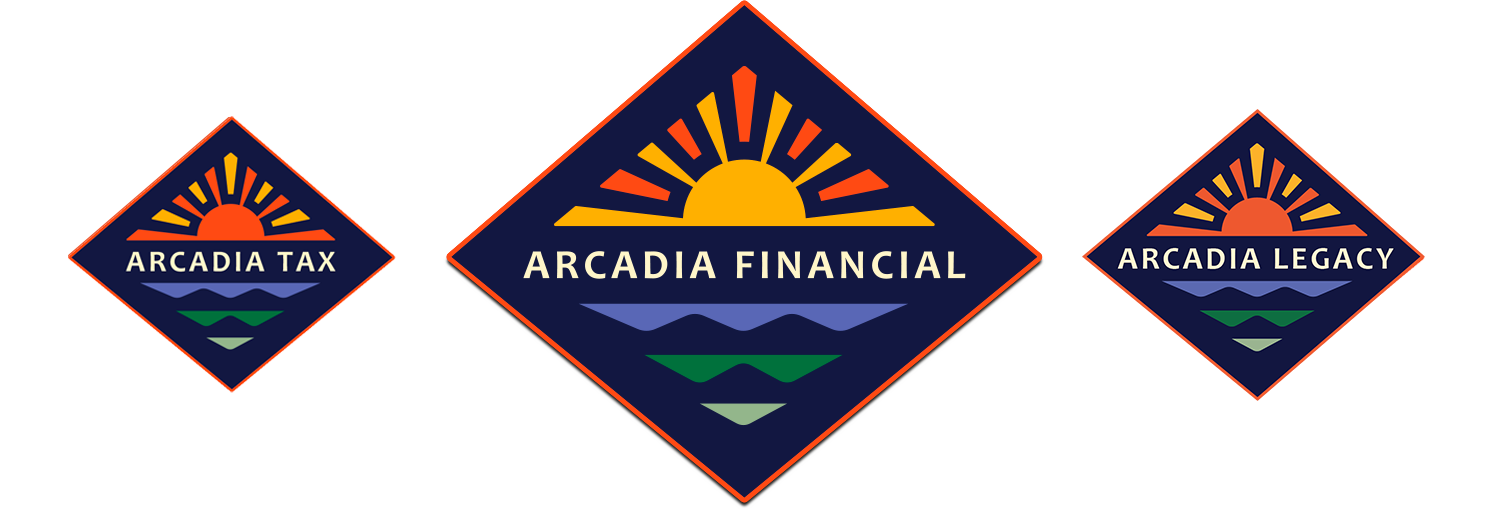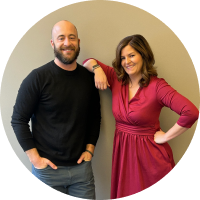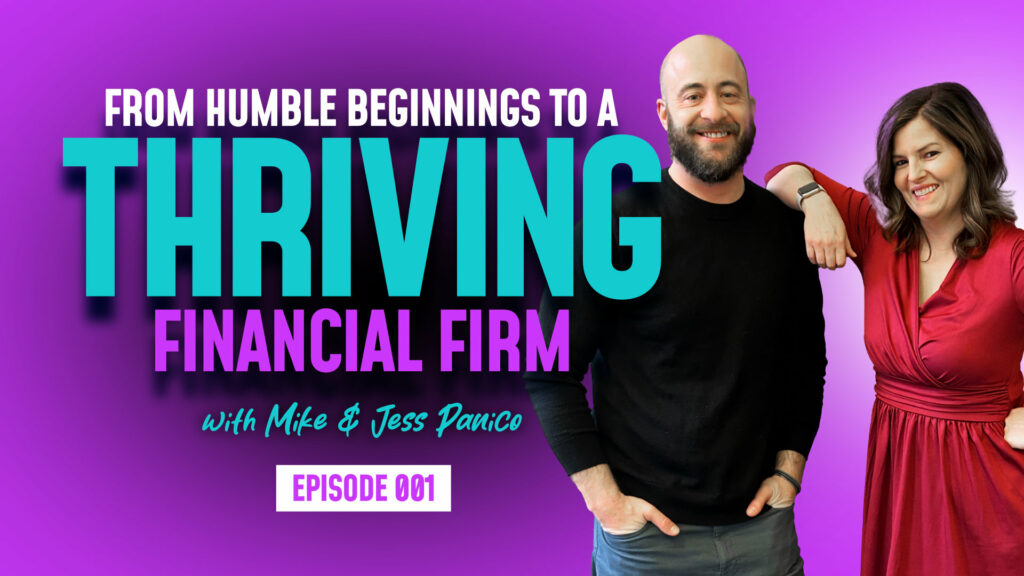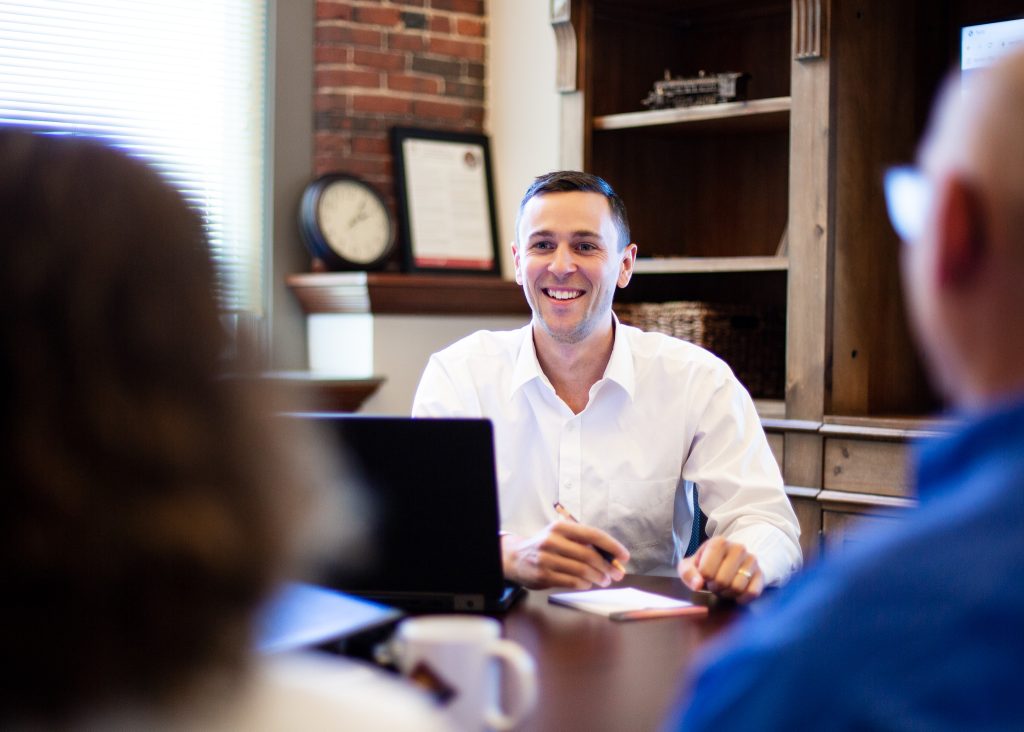Mike Panico: Hope you’re ready for the next episode. It’s Saturday State of Mind with Mike and Jess Panico. I’m Mike.
Jess Panico: I’m Jess.
Mike Panico: And Jess, I thought that today we could talk a little bit about some of the history of financial planning insofar as it kind of affects what Arcadia is up to and how we help clients.
Jess Panico: History and financial planning are two of my favorite subjects.
Mike Panico: Now, half of anybody watching this video probably just immediately turned it off. History lessons, but…
Jess Panico: It’s going to be fun, like Drunk History. You know that show.
Mike Panico: This is water, just to be clear.
Jess Panico: Okay, fine.
Mike Panico: At least that’s what we’re going to go with.
Jess Panico: But I do think that was very instrumental when we first started the show. We kept saying, “Can we do this like, Drunk History?” And they reminded us probably not, so.
Mike Panico: It helps loosen things up a little bit.
Jess Panico: Yeah, but no. So, we’re teetotaling right now.
Mike Panico: Okay. You know, I do think that people take for granted a little bit like what financial planning has looked like over time. In fact, it’s changed a lot, even like while we’ve been running a financial planning practice.
Jess Panico: Sure.
Mike Panico: So, something I like to sometimes do when I meet people for the first time is ask them to consider what do you think financial planning or retirement planning look like in 1776?
Jess Panico: Do you also do this on the other end of the spectrum where you ask them, what do you think financial planning is going to look like in 2035?
Mike Panico: Oh, like, what is retirement planning going to look like in the year 3000?
Jess Panico: Yeah, in the future. You’ll be in your flying car going somewhere.
Mike Panico: Flying cars, and it’s always seemed to be a couple of years away.
Jess Panico: Okay, well, maybe that’s the next episode as we talk about the future. But let’s go back, back to the past a little bit.
Mike Panico: So, of course, if you go back to, say, the country’s founding, which is just like any old day, doesn’t really matter how far back you go, you go back far enough. Retirement planning wasn’t really a thing, but most people didn’t live that long. I once read, I think it’s still true that out of all human beings that have ever lived, have never even made it past the age of 15.
Jess Panico: 15?
Mike Panico: Yeah, I mean, historically speaking, living is hard. There’d be, like, a lack of food.
Jess Panico: Living is hard.
Mike Panico: People from the other tribe coming over the hillside, like, ruining your village. I mean, getting to advanced age historically has been really, really difficult.
Jess Panico: Remember like people getting married at 14 or having children, like, starting. And they’re like, I have 14 kids until the last one killed me.
Mike Panico: You had to start a family at 14 because you had eight years left.
Jess Panico: Oh, my gosh, that’s depressing. And I think also, you had to have 10 kids because odds are some of them weren’t making it past 15.
Mike Panico: And you probably needed extra hands around the farm or whatever. Oftentimes, like mom sometimes would die in childbirth or like dad didn’t come back from the war. So, you would need those… I mean, life has just changed a lot, right? And kind of like a Hallmark moment, I think, in this story is that something changes around World War II, antibiotics, cleaner, like operating rooms, that sort of thing, people just start living longer.
Jess Panico: The introduction of penicillin was definitely a game changer.
Mike Panico: And people start getting older with more frequency. And so, prior to, it’s like if you actually made it to your 50s, 60s, and 70s, you probably like hung around the house with your kids and there’d be multiple generations in one house. You were minding the fire, minding the grandkids, maybe feeding the pigs or something. And maybe in the absence of family, there was like a church or a monastery or you hope so, right? Because otherwise, it would be really, really challenging to get on because there weren’t any societal safety nets. There wasn’t like 401(k) plans. These are all, in the last handful of decades, new development.
Jess Panico: You mentioned like all the family gather around the fire. The house that we’ve lived in for about 12 years now was built in 1790, right? And so, it’s really neat that you can see, and they’ve obviously added on because we would live in a two-room house they had from then. But there is that old beehive oven in the hearth that we have, where they had all the family, all the generations were there, and the houses were small in part that one, no one was building, like 4,000 square-foot houses back in the day. But also, that was like the main heating source. So, we heat the entire house. And you had multiple generations that would be there. So, it’s kind of crazy how you think of those old days and how that’s transformed to where we are now. And with financial planning is really no different.
Mike Panico: So, the way I understand it, actually, you’re going to go a little bit back before World War II, the Industrial Revolution, people are leaving the farm. They’re going to the cities. How do you keep good workers around? My understanding is the pension enters the fray. And you say to people, “Hey, if you stick it out with my company after you retire, I’ll continue to pay you even once you’re done working,” right? And that’s a pretty good offer. I think the first pension in this country gets introduced in the 1890s, something like that, which is pretty cool. I thought, or I think, it was like American Express actually that did this.
Later, everyone’s like, “Why don’t I have a pension too?” And that’s where the governmental solution comes in, in short, 1935, Social Security. So, if you think about it, like, Jess, think of your grandparents, they were probably retiring in what year? Like, the 70s, the 80s, something like that.
Jess Panico: Yeah. I mean, the 80s, my grandparents were 60. So, yeah, somewhere in the 80s.
Mike Panico: So, when they go to retire, like what is their retirement planning look like? Usually, mom hadn’t worked because generationally speaking, you go back to like, say, your grandparents’ generation. Most women were homemakers. Sometimes they were teachers, but they weren’t out in the workforce the same way that they are now.
Men also had a bit of a different experience, like dad would have worked for the same union or plant or business, usually his whole career. So, typically, there was a pension in the mix. They both have access to Social Security, and so long as those two income sources meet or exceed their budgetary needs, like Wah-la! If they want, they can retire.
Jess Panico: Can I just, one point of clarification, when we said mom didn’t work, I just like to throw a little something out there.
Mike Panico: For my personal safety.
Jess Panico: For your personal safety, that like, especially in those days, mom’s job was probably like running after five, six children, like…
Mike Panico: It is a full-time job, for sure.
Jess Panico: No doubt is it. But obviously, it’s not income producing. We’re talking about like…
Mike Panico: There’s no savings attached to it. It was strictly in support of husband’s efforts going out and working and that sort of thing.
Jess Panico: Sure, okay.
Mike Panico: People certainly didn’t have it easy, for big stretches of time. And things change, though, somewhere around, I think it’s 1985. Some geek somewhere out there notices this little flaw in the tax code that says, well, you can put money aside from your paycheck and have it grow on a tax-advantaged basis. And the code that he discovers that lays this all out is like subsection 401(k). And companies latch on to this thing because people continue to live longer. Pensions, as a result, are getting more expensive.
So, corporate America says, “Okay, you know what? Instead of us being on the hook for paying for the entirety of your retirement,” because here’s what’s interesting, right? When Social Security, as an example, was created in 1935, life expectancy was like 62, something like that. You fast forward at ‘85, and now, life expectancy is like in your early 80s, like late 70s, at worst. So, you have companies thinking, we can’t afford these pensions anymore. Why don’t we just create this pathway for people to save their own money, maybe as incentive or at least have some skin in the game will match it. But that’s where things really change, really where I think our industry starts.
Because again, going back to your grandparents, your grandparents probably didn’t have mutual funds or stocks or anything that people that we assist have today. Their company was taking care of their retirement problems. Their government was taking care of their retirement problems. But now, it’s ‘85, and companies are saying, “You know what? You’ve got to have a hand in this, too.” The 401(k) is born, and that’s where all of a sudden, people have to manage all of this stuff on their own.
Jess Panico: What I always think is interesting is that statistic that I know, you know is that when Social Security was introduced, what was the average life expectancy? And when did you get to collect?
Mike Panico: So, life expectancy in 1935 was about 62. Yeah, but the original law was you could begin collecting Social Security at age 65.
Jess Panico: So, they expected you to be dead three years before you could collect.
Mike Panico: Well, so not a lot of people know this, but the American people didn’t actually want Social Security, like, by and large. I mean, some people supported it, obviously, but they looked at it as just an additional tax. So, the Congress knew at that time, well, especially, post World War II, a lot of men and boys, they didn’t come home from the war. So, Americans really did value life insurance because it did bail out a lot of households where those husbands didn’t come home, right? So, it replaced the income that was lost as a result of them losing their lives.
So, the way that they pitched Social Security was really to think of it less as like an additional tax and more so like insurance, like old age insurance, if you will. In fact, there’s a clue that there’s some truth to that because when you look at your pay stub, it doesn’t say Social Security tax. There’s that acronym, FICA, and that stands for Federal Insurance Contributions Act. So, the way that they sold it…
Jess Panico: So, it’s insurance. It’s not tax. Taxes are bad. Insurance is good.
Mike Panico: Well, I’m trying to say at one level, you can say, well, look what Congress did. They were no different then than they are now. They created this thing that you wouldn’t benefit until you were 65, but life expectancy was 62. But it was also put forward as insurance, like most people don’t die young, right? Most people don’t crash their cars. Most people weren’t expected to make it to 65 and beyond. So, it really just was for those outlier people.
Jess Panico: Just in case you need something. Okay, all right. So, maybe they’re not as rat as I thought I was alluding to.
Mike Panico: Yeah. And that’s, of course, a generous interpretation to some extent. But here we are, the pension has effectively gone away. I mean, there’s no new pensions getting created. I’ve always said to people, like yours is the last generation that’ll probably see pensions in earnest, right? Because they’re just very expensive, certainly for private companies. So, we have the 401(k) and it’s like a shift because before, like your grandparents, where there’s Social Security and the pension, it’s effectively like, well, it’s somebody else’s problem to make retirement happen.
But with the 401(k), it’s now your problem. You have to decide how much money you put in. You have to decide what risks that you’re going to take. You have to decide when you’re going to start taking distributions, how you coordinated with Social Security. So, it’s easy to see from this then perspective that somewhere in the late 80s, early 90s, people were like, I don’t… I’m a schoolteacher. I’m a bus driver, right? I’m a mechanic. I don’t know how to make these decisions. Can somebody help?
Jess Panico: I don’t want to manage my own money. Like, what if I mess up? This isn’t my day to day. It’s not what I do. I’m not an expert in this. I’m not pulling my own teeth, right? I’m going to the dentist for that. Like, so who’s helping me with this?
Mike Panico: And hence, financial advisory is more or less born. There have been stockbrokers and similar before that. But in terms of putting together an actual retirement plan with all of its individual components, like that wasn’t really a thing. And it’s crazy to say this until something like 30, maybe 40 years ago at the very most.
Jess Panico: That’s kind of crazy.
Mike Panico: Yeah.
Jess Panico: That’s a good story.
Mike Panico: It is pretty cool.
Jess Panico: I like that.
Mike Panico: But it allows us to advance things a little bit further because for the most part, when you look at retirement planning, it’s not just one thing. There’s all sorts of things that you have to prepare for in order to say, “Okay, I’m ready for the next 20, 30 years, like this next chapter of my life.” You have to replace your paycheck. So, you need an income plan. You want to reduce the amount of taxes that gets applied against that income and against the other savings that you have. So, you need a tax plan.
By the way, that other savings, there needs to be an investment strategy for that because you want that money to continue to grow. What if there’s a health event along the way? So, maybe we need additional insurance or something that’s going to supplement your Medicare. And then finally, it’s like, where does all this money go when I’m gone? And so, that invites the lawyers with their estate planning, your wills and your trust and that sort of thing.
Jess Panico: So, there’s like no doubt that things have gotten way more complicated.
Mike Panico: Way more complicated, yeah.
Jess Panico: No wonder why there’s a whole industry born out of people just helping you navigate this.
Mike Panico: Well, not just one industry, there’s many, because everything I just said there is effectively, like, its own silo.
Jess Panico: The insurance guy, the investment guy, the tax lady, the estate planning lady.
Mike Panico: Right. So, the average person when they’re navigating all of this has maybe an investment person. Maybe they’re doing some of this on their own, but they might have a tax preparer. They might have an attorney that’s helping them draft all their estate planning documents. They might have somebody that’s helping them with certain types of insurance, like life and disability, but then somebody else that’s helping them with home and auto. There might be a third person that’s helping them with Medicare supplement and similar. So, when you start counting on all your fingers and toes, how many professionals you might need to package all this together? Sometimes you might need five or more professionals, and that’s kind of a lot.
Jess Panico: I might have to take off a shoe to start counting at this point.
Mike Panico: Yeah.
Jess Panico: And not to mention, have to coordinate so many different employments and driving around and Christmas cards.
Mike Panico: Well, it gets daunting, like, inflection points. So, sometimes financial planning doesn’t matter until it’s the only thing that matters. Like, I think for a lot of people, their financial plan is on autopilot or it’s just not something they think about a lot until something big changes. You’ve lost a job. There’s a death in the family. You got to move across the country. All of a sudden, you’re scrambling. I got to move this money. I got to make these big decisions. I got to take a big withdrawal. But now, if you have five different professionals, right, I’ve got to talk to my accountant, I’ve got to talk to my investment person, I’ve got to talk to my attorney, you might not be able to do that as quickly as you’d like. You might be getting conflicting or confusing advice. They’re not all on the same page. So, it can get really stressful really fast.
Jess Panico: Yeah, no doubt. And there are so many of those disparate professionals, like they really do impact and work with each other. I mean, you’re taking a big withdrawal, like for your financial advisor, what tax consequence does that have? So, then now, not only do you have to consider both, but get those people talking to one another or writing down all the information that you barely understand and calling the other professional and rattling that off with like, well, this guy said that. So, like, no, no, he doesn’t know what he’s talking about. And it’s like, oh, my gosh, where do I go? Who do I trust?
Mike Panico: And Arcadia, even for a good majority of our existence, was just like one card in the Rolodex for a lot of people who would be going through one of these inflection points. So, someone’s going through a job change or whatever, they’d contact us, but then they’d have to have a separate conversation with their accountant or whatever. And at some point in the journey, we start to say to people, “Well, it’s not right that you have to navigate all this on your own. You know what? I’ll contact your attorney for you. I’ll contact your accountant for you. We’ll see if we can get them on the same page.” Like, what ideas pass each other?
But as frustrating as it can be for just an individual to coordinate that, it wasn’t any easier or better for us to do it, because to some extent, there’s professional courtesy. Oftentimes, these other professionals would contact us back and do it quickly and do it in the right same spirit by trying to help people and make sure that everything was coordinated. But then there would be times where you couldn’t connect with these people. The timing wasn’t working. Someone’s on vacation. It’s tax season. So, we would run into a lot of frustrations too, where we’re trying to do things comprehensively, but we weren’t able to do it because we were running up against like, say, professionals that weren’t like-minded or weren’t available, or sometimes there was like ego and all sorts of other wild things that would be involved, just that would get in the way.
Jess Panico: Makes me think of, I don’t know if you ever call the pharmacy, but when you do, like I call CVS and there is this prompt that takes you through 20 different things. But the very first thing they say, “If you’re calling from a doctor’s office, press 1.” It’s kind of like, it’s express lane. If you hit that, they’re going to, “Oh, it’s a doctor calling, I should answer that right away,” whereas you’re just a patient calling in, just a patient, you have to listen through the 18 other prompts to click to get where you’re going. So, wouldn’t that be great if all these different services are coordinated? It’d be like, hey, if you’re another professional calling to get business done for our clients, like patch them through right away, but that doesn’t exist.
Mike Panico: No. And I’m a little bit embarrassed to admit, I don’t think it was until COVID, we were on some sort of coaching call. And there was people describing all these new services that were coming out because of the pandemic. A lot of them were online only. And there were some couple out from the Midwest that had like a… what was it? Like, a bookkeeping service, something like that.
Jess Panico: Yeah, they did a couple different positions. It was like bookkeeping, virtual assistant, web design.
Mike Panico: But it was remote, right?
Jess Panico: It’s all remote stuff.
Mike Panico: Instead of having a remote person, you could outsource your bookkeeping needs as a business to this couple and their thing…
Jess Panico: Yeah. So, you didn’t have to bring somebody on board if you didn’t need them 40 hours a week. You have all the payroll expenditures and things like that.
Mike Panico: So, I believe their story was they built this big business really fast in the middle of the pandemic. They sell it. They probably become multimillionaires, like multi, multimillionaires overnight. So, they described, well, all of a sudden, our financial planning is really rapidly involved. We have all this money, all these investment decisions to make, all these tax consequences. So, they found something that I didn’t even know really was a thing called the family office. And you can usually find these in downtown cities. Like, they’re pretty exclusive and rare because they cater to just small families and usually wealthy families because if you’re going to provide coordinated, intimate service, generally, it’s going to require that you only work with a small handful of people.
Jess Panico: Right. I mean, think of how many relationships you have in your life. Like, how many friends can you manage to have a very intimate connection with?
Mike Panico: I know a lot of people like Vanguard. Vanguard offers excellent mutual funds. They’re very cheap, but they have millions of customers. So, it’s not like Cheers or something, like where everybody knows your name when you call Vanguard. It’s like an 800 number to call center. So, it’s a bit of an alienating experience.
But suppose you’re a very wealthy family and you want to make sure that you have the best possible investments that the tax guy is working in cahoots with your investment planner, that the estate planning attorney is involved in all this and updating things. And what really struck me in their conversation is like, they said, when we go to meet with our financial planner, our kids come along because we wanted our kids who were one day going to inherit some of this money to have good behavior around money, to have good values around money. And it just really struck me that you can do, just go beyond portfolio management or basic strategies, the X’s and O’s of finance, tax savings, and strategies. You can actually work at a really personal, intimate level and help families that are not only going through, say, like big or massive change, but think about intergenerational issues and how money’s going to change a family or what direction it goes in in the future. It just really struck me like a bolt of lightning.
Jess Panico: Yeah. And it’s really cool if we see folks come in in their 60s while their children might be like 30 to 40, something like that, so not kids, not children, but like their children. And it’s always great to bring them in, if that’s what mom and dad want to do, they want to make them aware of their legacy that they’re leaving and the goals that they have for this money.
But even people that are in their 30s, bringing your kids along that might actually be kids, like teenagers, like 20s, I don’t know, call me cynical, but I just do not think our American education system does a great job teaching kids about money finance. Like, open a 401(k), you get a free match at work when you start your first job when you’re 22. Like, you better sign up for that. That’s free money. Invest now, not later. So, it’s such a cool concept to be able to share that with your children.
Mike Panico: Yeah, we do the opposite. You remember the first mail that you got in the mailbox when you got to college, right? You get your own little PO box. And you remember what’s some of, like, the first mail you would get.
Jess Panico: Besides the fliers for the pizza place?
Mike Panico: Right.
Jess Panico: It was a notice from Sallie Mae.
Mike Panico: Or, like, credit card offers.
Jess Panico: Oh, yeah, those are big, too. It’s like, if I sign up, they’re crediting me 500 bucks, like I’m going to get 10 of these.
Mike Panico: It’s not uncommon for some of the first moves you make as a young adult to be really, really bad financial moves. Like, you’re going into tons of debt and then you have credit cards. So, I mean, that’s a totally different topic.
Jess Panico: You probably saw less of that because you went to business school and you would hope that there was a lot of financially savvy people there. I went to school where it was more medical professionals than I remember. I didn’t even know a ton at that age, too, but my roommate. I’m like 18. And I’m like, “How are you buying all this stuff? You don’t have a job?” She goes, “I got a credit card.” And I’m like, “Do I have to pay that?” She’s like, “Not now.” I’m like, okay, enjoy ruining your credit forever.
Mike Panico: We got off that call and I said, “Jess, why don’t we do the same thing for our clients? Offer them this environment where we can offer to have their kids be involved, but also have ancillary professionals involved in the process.” And we made a decision, I think, within a matter of weeks, if not a month or two, to bring in tax professionals, to bring in legal professionals to the extent that it was possible, such that you’re going through a big change in life, you’re changing jobs, there’s a death in the family, you’re deciding to retire. Instead of you having to go all around town, well, I’m going to go have one meeting with my accountant, a separate meeting with my insurance person, and a third meeting with my investment person and a fourth meeting with the attorney. I mean, it’s just exhausting to even explain all these. How about instead, you can just come to one place where all these people work in close coordination with each other?
In fact, like effectively have the family office experience, but have it offered to ordinary people. So, right now, traditionally, to get that kind of service, you need tens of millions of dollars. But what we’ve discovered is if you get the right like-minded people together, you can offer this to just regular, everyday people.
Jess Panico: And I can’t say it was that easy. It wasn’t a slam dunk because we had a few different partners that were in-house, but people were for business, too, or our clients just seemed to use this accounting or attorney or whatever it was. And we talked to him or her and be like, man, this person is just really on a different page than me. And they don’t work for me. Like, I can’t control that. But the goals and offering, just like a better service, a better experience for people, that’s not… always, that’s important to us, but maybe not important to them. So, it was something we really couldn’t control very much and thought if we had a family office, we could be making more of impact.
Mike Panico: And we’ve recently started calling it a complete financial planning process because there’s a lot to talk about. We do comprehensive planning here.
Jess Panico: Holistic.
Mike Panico: Comprehensive with a lot of companies and firms. And I’m not even casting any stones here, but it’s generally pretty narrow in scope, but it’s using a big word. I mean, when you say comprehensive, I think, oh, you must be covering everything, but…
Jess Panico: I think of like car collision comprehensive coverage, yeah. I don’t even know what that covers, but it seems like a lot.
Mike Panico: You used to go in a lot of car wrecks, Jess.
Jess Panico: That’s not… You want to put up our tally sheet. You can pull up the tally sheet right now.
Mike Panico: It’s mostly parking tickets, actually, if I’m being fair.
Jess Panico: Yeah. I did get a boot once.
Mike Panico: Okay. But anyway, the comprehensive thing, effectively, for most companies, it means while we do investments and insurance, maybe we do something in the way of tax planning or strategy.
Jess Panico: Stocks and bonds.
Mike Panico: But there’s going to be gaps. Well, we don’t do the will, we don’t do the trusts, we don’t do Medicaid supplement or advisory. We don’t talk about Social Security. That’s not a thing. So, what a lot of those firms have to do is that they have to have referral relationships. Here’s some business cards of some folks around town who can help fill in the gaps. And we’re like, that’s not comprehensive.
So, to us, when we say a complete financial planning process, other than banking, because Arcadia, we can’t help you with checking or savings, we don’t give out loans, but just about any other retirement planning decision that you have to make if your dollars and your cents touch it, if it’s a tax planning thing, if it’s about investments, if it’s about Medicare, if it’s about Social Security, if it’s about making a pension decision, we have somebody here, and in often cases, these are people with years and years of experience that can consult with you such that… and I love describing it to people so they can imagine it. When you’re going through a big inflection in life, you can sit down with your accountant, your attorney, your financial advisor, anybody that we need all in the same place, all at the same time. Oftentimes before the meeting even happens, these people have already coordinated, consulted with each other, come up with a joint game plan. And so then, when it’s presented to you, everybody is on the same page and pointing in the right direction.
Jess Panico: You know, and obviously, that makes a ton of sense, like tactically. Like, in building a complete plan, what does that look like from finance, tax, legacy, all that? So, yes, tactically, that makes 100% sense. But more so than that, like, what are you trying to accomplish? I think that’s what brings us back on to this mission statement we have here. We know everyone is on board with the same mission, and our mission doesn’t say to get you the highest rate of return or to make sure you save the most in taxes or to file a will effectively. It says that we’re going to challenge you to fearlessly live like every day a Saturday. So, knowing, yes, absolutely, you’ve got the complete plan put together, but all of us, all your professionals are working together to challenge you to go out there and live the life you want to. It’s not just all about the dollars and cents. It’s bigger than that.
Mike Panico: Absolutely. And I think in future conversations, we can talk about how that sausage is made, what it takes to coordinate all those professionals, and what the planning process looks like.
Jess Panico: I don’t think I want to have sausage as a name, but that’s okay.
Mike Panico: Well, we’re going to talk about it nonetheless. So, I’d say, join us for the next episode, Saturday State of Mind. We’re going to continue that conversation.
Jess Panico: See you then.







